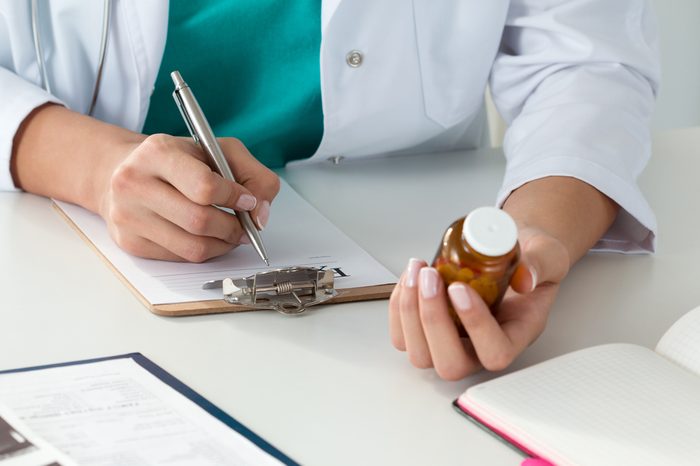
What happens if I don’t take this medication?
“Many patients feel medications should be taken as needed, and skip doses because they’re not aware that it could have consequences,” says Eudene Harry, MD, medical director of Oasis Wellness & Rejuvenation Center in Orlando. But many conditions, such as high blood pressure, don’t have overt symptoms, she explains; the drugs to counteract it need to be taken regularly to have their intended effect. Also, learn the questions you should ask your doctor before taking any medication.

Is this medication compatible with my supplements?
Many patients assume that vitamins or herbal preparations are benign and won’t interfere with their prescription medications, says Dr. Harry. That’s an incredibly dangerous assumption, she warns: There are plenty of drug interactions with herbs and nutrients, and some can be deadly. Patients on certain antidepressants, for example, should not take St. John’s wort. Checking with your doctor—and your pharmacist—is the safest course of action. Check out these herbs, supplements, and over-the-counter drugs you don’t want to mix.

What changes can I make to improve my condition?
Diet, exercise, sleep, and stress are all huge factors that impact health—and are all completely under a patient’s control. Yes, drugs and other therapies may be necessary, but in almost every case, your health can be improved with tweaks to those four factors, Dr. Harry advises. In addition, she says, sometimes patients can feel helpless about what is happening to them. “Knowing that they can contribute to the healing process often motivates patients to be more involved.”

Can you repeat that?
“Sometimes people don’t want to bother the doctor or feel embarrassed to admit that they didn’t understand instructions. I would much rather take the time to explain,” Dr. Harry says. “Understanding is the key to working together.” In fact, you may want to also ask, “Can I record this?” More patients and doctors are recording medical appointments, according to two 2018 surveys published in the Journal of Medical Internet Research. More than a quarter of doctors said they had recorded their sessions for patients to use later. Less than 20 percent of patients reported doing so, however. Now that every smartphone can easily record interactions, you can put the technology to use in helping you remember complicated instructions or medication names. It could save your life. For example, make sure you fully understand any medication side effects before leaving your doctor’s office.

Why is sex painful?
As a rule, people don’t like to talk to their doctors about sex. “It’s the original ‘Don’t ask, don’t tell,'” says Mache Seibel, MD, an ob-gyn in Newton, Massachusetts. But while nearly half of all women will experience some kind of pain or discomfort during sex at some point, only about seven percent get treated. Remember, doctors aren’t there to judge; whatever the problem is, from vaginal dryness to vaginismus, this is not going to be the first time your doctor has heard about it. Here are some common reasons for painful sex.

I have a new partner—what should I do to stay safe and healthy?
It’s important to have this conversation with your doctor whenever you have a new partner, especially if you were previously in a long-term monogamous relationship. “When you haven’t dated in a while, you don’t tend to think about the risk of sexually transmitted diseases and pregnancy,” says Dr. Seibel. “Sometimes I have the same conversations with women in their 50s and 60s that I have with their daughters.” Learn why it’s important to revisit your birth control options.

Can I make a follow-up appointment to finish our conversation?
“Most patients will wait until the appointment is almost over to ask what’s really troubling them,” says Dr. Seibel. “This can happen either because they’re afraid or embarrassed.” But doctors have to stick to a schedule or risk cutting into another patient’s time, which means they can’t extend the visit. Asking for a follow-up appointment will give you a chance to address the issues on your mind. Learn how getting a second opinion from a different doctor saved a woman’s life.

Can I bring in my spouse so we can discuss this together?
Many times, people assume the appointment is just for them, says Dr. Seibel, even when they’re dealing with an issue that includes their significant other. Sexual or fertility problems affect both parties, so both should be present. And you’ll have the added benefit of another set of ears, which can come in handy because patients only retain about 10 percent of what their doctor tells them, studies have found.

Are there things I can do to help or that might hinder treatment?
Patients come to checkups expecting cures for their health problems, but sometimes they forget that they play an important role in their own recovery. It’s something Stuart Frost, DDS, author of The Artist Orthodontist, sees frequently when correcting smiles (and the reason so many dentists sound frustrated about their patients’ lack of flossing). “It’s valuable for patients to understand that they have a role in successful treatment,” says Dr. Frost. Following your health-care practitioner’s treatment advice, practicing good hygiene, and keeping regular appointments are all ways patients can help in the process. (Psst: Here are the secrets your dentist wont tell you.)

How often do you need to see me?
“Follow-up is critical to a treatment’s success,” says psychiatrist Daniel G. Amen, MD, founder of Amen Clinics, Newport Beach, California. This is especially true for mental health visits, where treatment isn’t just one and done. Getting the answer to this question will also give patients a timeline for their recovery and set realistic expectations. (Here’s how to find the right therapist for you.)

What sort of improvements and problems should I expect?
Your treatment can be a journey, and you should know what kinds of signposts to look for—good and bad. Being aware of potential stumbling blocks, challenges, side effects, and failure rates can help you anticipate issues and important improvements; you and your provider can come up with strategies for dealing with both. “It gives patients strategies they can follow to make sure the treatment is successful,” Dr. Amen says.
Next, check out the questions you need to ask your gynecologist.
